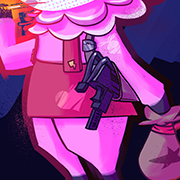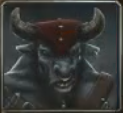|
OzyMandrill posted:If it's an industry focussed course then this worries me - Max/Maya are so entrenched, not knowing them will just lead to your CV going straight into the reject pile in the first cut.
|
|
|
|

|
| # ? Apr 16, 2024 14:17 |
|
OzyMandrill posted:If it's an industry focussed course then this worries me - Max/Maya are so entrenched, not knowing them will just lead to your CV going straight into the reject pile in the first cut. It's definitely better to know one of those but it's not going to get your CV tossed if your portfolio is really good. Portfolio is king, really, and no one is going to pass on someone with a good portfolio because they didn't do it in Max/Maya etc. Artists have to learn a ton of tools, and it's expected that there's going to be several months of training just to learn the workflow and whatever tools the studio chooses to use. It's impossible for artists to know all of the tools out there so it's generally not a great idea to filter resumes just by the tools listed. The MOST IMPORTANT factor for artists is the portfolio. I can not stress that enough. Nothing else on your CV or resume will really make up for a weak portfolio. I can train artists on tools. They're not that hard to learn, and most artists get up to speed within a few weeks. I can't really teach art fundamentals. Those take a long time to develop, usually on the timescale of years, sometimes decades. It is very obvious if an artist is a good artist regardless of the tools they're using. I always stress to teachers and professors to focus on fundamentals and a strong portfolio. Use whatever tools you're comfortable in and will help you work quickly. If you have good fundamentals and a good portfolio, you'll always have offers on the table.
|
|
|
|
I agree with Gearman. Learning how to learn tools is more important than learning some specific tool. Learning how to make Good Art is most important.
|
|
|
|
Akuma posted:Agreed. My studio can ship 15+ titles a year and it's very rare to use something other than Max or Maya. Obviously it happens here and there but it'd be like a programmer choosing to learn LUA and not C++... I'd feel better about someone with robust C++ experience learning LUA for a project than necessarily the other way around. I'd say shipping 15+ titles in a year is very rare! I get what you're saying with the programming language comparison, but it's not quite in the same ballpark. There's a big difference between knowing a scripting language like LUA and an object-oriented language like C++ and you just can't do the same kind of things with both languages. Functionally, there really isn't anything you can't do in Max, Maya or Blender that the others can. They can all produce the same kind of asset albeit in slightly different ways. The output is the same format though and functionally there's no difference between an fbx from Max, Maya or Blender (technically there is but the differences are easily adjusted). As a general rule I recommend the following for the largest coverage of industry tools: - One of: Maya, Max, Blender (in that order) - Photoshop - Substance Painter - Zbrush - One of: Unity, Unreal - If you need to learn offline rendering, just use Cycles in Blender.
|
|
|
|
mutata posted:I agree with Gearman. Learning how to learn tools is more important than learning some specific tool. Learning how to make Good Art is most important. This is true, and once an artist is looking at your portfolio your work will be what's judged and not your tools. However, your resume needs to get through HR before anyone looks at your portfolio, and if Max/Maya isn't on there it might never get seen by the art team. If possible I would recommend taking advantage of student licensing to get familiar with the Big Two, but do the bulk of your work in whatever is available. Being able to discuss the differences in the software packages will be a good thing in the interview as well. If this professor is able to use academic licensing to provide a semester of experience with Max or Maya (and introduce blender for personal use), I think that would be the best for career advancement.
|
|
|
|
Tricky Ed posted:... if Max/Maya isn't on there it might never get seen by the art team. In theory this is true, but in practice it almost never happens. These days, most companies use some kind of software like Greenhouse or Jobvite or Workday and, if a resume gets a submitted, is made available almost immediately to people on the art team that are involved in the hiring process. Your portfolio is visible and available to people on the art team pretty much immediately. The only time people really get filtered out based on skills on their resume is when a company is looking for very specific skills and very specific domain knowledge. This is typically stuff like tools or pipeline programming experience with Python, C++, C# etc. or lots of experience with procedural workflows in Houdini or Substance Designer, or shader programming knowledge (though even that is pretty language and platform agnostic). In the VFX world, you can literally get hired almost without an interview just by having Flame listed on your resume. But, these are all rare and very specific instances that typically only apply to people that are highly specialized and know to market themselves based on their specialization. An artist applying as a 3D generalist or environment artist, or character artist is almost never going to get filtered out from not having specific software listed on their resume.
|
|
|
|
ok aside from software discourse could we go into more about specific resources/advice for students? https://www.youtube.com/user/GuerrillaCG/videos even though this channel is absolutely ancient, i feel like these videos do a really fantastic job of explaining basic 3d concepts to a novice. if anyone has a better example id love to hear it
|
|
|
|
Kanine posted:ok aside from software discourse could we go into more about specific resources/advice for students? I like https://www.youtube.com/channel/UCwdKySs6j48yl1ae8csAurQ just because he's done like over a thousand videos on hundreds of topics that are tangentially related.
|
|
|
|
Royal Skies' tutorials were instrumental in getting me to learn blender. They're brief and to the point on a range of generalist topics which is helpful for a solo dev but I don't know how well they would translate to a specialist focusing on one area. Eventually you get used to the sweaty car salesman cadence of his voice. Grant Abbitt's Beginner Exercises are done in Blender but cover broad general topics on problem solving and workflow.
|
|
|
|
I'm sure its part of why you would try to teach people tool agnosticism, but something thats really difficult to hammer home is that making good art requires good artistic fundamentals. Or rather it does get said pretty often but its super tough to get people to actually believe it. So so so many people seem to think that the reason their current stuff sucks and 'X' is so much better is the tools. "Oh if I had made this model in Maya everything about it would be better!" Well, no. The right tool for the right job can certainly make things easier. But if you don't have a solid grasp of the fundamentals in the first place you're in for a bad time no matter what. Composition, light/shadow, color theory, anatomy, and a hundred other things are just as or more important than whether you choose 3DS Max or Blender. A master digital painter can make an amazing piece with a box of crayons and a peice of paper, while you can give an amateur the best multimillion dollar tool for the job and still end up with something lackluster. Game dev is particularly prone to this since its often people with no art background trying to suddenly make AAA quality art. And Practice. Practice. Practice.
|
|
|
|
|
Tis a poor workman who blames his tools.
|
|
|
|
Akuma posted:Obviously it happens here and there but it'd be like a programmer choosing to learn LUA and not C++... I'd feel better about someone with robust C++ experience learning LUA for a project than necessarily the other way around. Me: (Spends multiple years in Lua because itís the only language thatís ever really clicked, dabbling in others only when necessary.) ...Well, poo poo.
|
|
|
|
I don't know that many state side studios using Max but then its not something I'm always looking into. Knowing Maya opens a lot of doors in film/animation/VFX. Knowing how to learn is best but if I had to pick one to focus on over another it would be Maya. This is speaking from working in games and transitioning into animation.
|
|
|
|
One thing that can get lost in the tool mastery discussion is that mastering some tool is actually extremely important. If you have mastered your tools you will be much, much more efficient than somebody with a superficial understanding of them, and you will be able to solve some problems others simply can't. The reason people tell you it doesn't matter which tool you pick is that it's reasonable to expect somebody who is a master of tool A will be able to get to a high level of proficiency fairly quickly in tool B which serves a similar purpose with different implementation details. Just be aware that "tool choice doesn't make you" doesn't mean you can get very far only being kinda proficient in a bunch of different tools.
|
|
|
|
Yeah You kinda have to have something. I got a gig as a master of none but I had a masters deg and connections
|
|
|
|
https://www.youtube.com/playlist?list=PL42m9XiTqPHJdJuVXO6Vf5ta5D07peiVx Just found out about this playlist that seems to do a decent job of explaining the different roles in game dev. Seems like a good resource to show anyone you know who is curious about how game development works or is looking to figure out what aspect they want to focus on!
|
|
|
|
it seems like houdini is becoming a tool that a lot of environment artists should learn? or is it mostly the realm of technical artists
|
|
|
|
Kanine posted:it seems like houdini is becoming a tool that a lot of environment artists should learn? or is it mostly the realm of technical artists The software itself is mostly used by tech artists and I donít see it becoming a requirement for rank and file env artists anytime soon but knowing it would certainly give you an edge over many other artists. If there are Houdini powered tools (integrated into editor via Houdini Engine or otherwise) it will make you a much better ĒcustomerĒ for the TDs/TAs and if the organization is cool with it I donít see why you couldnít do some small modeling tasks and tools with it yourself that would be very painful to do in other programs. I could see it being useful for complex booleans, fracturing/destruction/erosion, turning meshes into volumes and back into a mesh after modifying the volume, cloth sim, terrain meshes, scattering etc. All in all I think cultivating a skill set that stands out within your field is always a good idea for your career.
|
|
|
|
For anyone that does game writing, is there a program or method you use for complicated dialogue chains? I'm doing a thing in Dreams with a conversation that's several levels deep and I'm literally using pen and paper, lol. NBD because it's Dreams but something a bit less clunky would be nice.
|
|
|
|
SubponticatePoster posted:For anyone that does game writing, is there a program or method you use for complicated dialogue chains? I'm doing a thing in Dreams with a conversation that's several levels deep and I'm literally using pen and paper, lol. NBD because it's Dreams but something a bit less clunky would be nice.
|
|
|
|
Akuma posted:Twine!
|
|
|
|
I'll be the "voice from a different perspective" guy for the learning maya/3dsmax/blender thing: Yes Maya and 3ds max are the go to in the industry but the industry now has a big small studio part to it now and they often love the free Blender for things so being really good at blender could give you an edge if your goal is to join a small tight team working out of a garage but obviously you should train the way you intend to fight so only do it if that's your goal. Also echoing the portfolio thing for any sort of creative work. And while I don't recommend it you can do basically anything with Houdini if you really want to (probably not Substance designer stuff). Flannelette fucked around with this message at 07:22 on Jan 21, 2021 |
|
|
|
|
I have two questions: - Is working as a game developer as lovely as it is perceived to be? All I see on forums and news is layoffs and crap working conditions. - I assume if I make a game by myself or a few friends and put it on Steam and what not it will be overlooked make like $8 at most? I can't imagine anyone can make a living making indie games with these storefronts being so crowded and competition so high.
|
|
|
|
punk rebel ecks posted:I have two questions: There's about a bazillion indies that no one has heard of for one of the minor successes.
|
|
|
|
punk rebel ecks posted:I have two questions: Working as a game developer varies wildly in quality. It's nearly always worse for you if you're not white and male. Rockstar is worse than you've heard. EA is often better than you'd think. A lot of it depends on your team and your particular studio. The unfortunate truth is that the industry as a whole underpays and is pretty terrible at project planning, but for many of us the opportunity to work on something fun is worth the tradeoffs. I personally haven't ever had a job that I loved as much as this one, and probably won't again. I'm also working hard to not have to do it in my 50s. If you don't have a way to generate significant hype outside of Steam, you will almost definitely make negative money on a new game. You need marketing and luck to get your game in the hands of people who want to play it.
|
|
|
|
Part of the problem I have when looking into all these "so you want to be a game dev eh?" videos is it shows people who are incredibly talented. While I'm working my hardest to get to that point, I sometimes kind of feel like I'll never be "good enough" to "make it" especially surrounded by talented peers. Are there any positions that hire new-to-industry artists with older ones as mentors without expecting you to be perfect at your job, or any kind of mentorship you can get without being in art school, that kind of thing? Does anyone have stories of people just sucking in game dev but somehow ekeing out a living anyway?
|
|
|
|
Tricky Ed posted:Working as a game developer varies wildly in quality. It's nearly always worse for you if you're not white and male. Rockstar is worse than you've heard. EA is often better than you'd think. I recall reading/hearing that Nintendo is (surprisingly) the best? Tricky Ed posted:A lot of it depends on your team and your particular studio. The unfortunate truth is that the industry as a whole underpays and is pretty terrible at project planning, but for many of us the opportunity to work on something fun is worth the tradeoffs. I personally haven't ever had a job that I loved as much as this one, and probably won't again. I'm also working hard to not have to do it in my 50s. That definitely is enticing. Just how bad is the pay exactly? Also, is the work environment for an established indie studio better than a big corp on average? Skwirl posted:There's about a bazillion indies that no one has heard of for one of the minor successes. It seems that the median is just under $5,000. Not surprised.
|
|
|
|
punk rebel ecks posted:- Is working as a game developer as lovely as it is perceived to be? All I see on forums and news is layoffs and crap working conditions. My experience as a programmer at medium to large studios: As mentioned, this varies a lot depending on the company and circumstances. I believe I've had it a bit better than most. In the ~14 years I've been in the industry across three companies (technically four, but just started with a new one, so not really counting it), I've experienced two layoffs due to cancelled projects - one where I lost my job, one where I didn't - and probably only about three months total of actual crunching. Some companies (looking at you, EA Sports) seem to budget the crunch time in to the schedule, and it gets even worse when the schedule inevitably slips. When I first started, my pay was much lower than it would've been in a non-games development position, though the gap has narrowed quite a bit over time. Still probably a bit lower than it should be. The actual work is pretty cool when things are going well. You work with a reasonably diverse group of talented people who want to be there and care about what they're doing. It's awesome seeing things go from concepts, through design and into a real game. It can be both rewarding and frustrating having people play and comment on your work. Some players are entitled assholes who do nothing but poo poo on you, others are appreciative and cool and it's clear the really enjoy the games. One thing that's been universal at places I've been so far is that production is a bit of a mess. Keeping things running smoothly and on schedule is a constant losing battle, which can make things stressful. Management is usually varying degrees of out of touch and priorities can shift frequently. Another thing I rarely see mentioned is that you'll likely be working on something you aren't actually super interested in playing. It's not like a solo or small team project where you get to choose what you create. For the majority of people, your input on the direction of the project is relatively small. These days, the major downside for me is the instability compared to other industries. Even though I haven't personally experienced as often as some, the threat still kinda hangs over you. For example, I really want to buy a house and settle down in once place for an extended time, but I have no certainty about where I'll be working next year, let alone ten years down the line. This may just be me, but in the last 15 years, no place has really felt like home. My whole life has a "this is temporary" feeling about it. Edit: Just to clarify a bit, by "reasonably diverse" I was referring to having a mix of different backgrounds and skill sets and so on. We still have problems with racial and gender inequality and such. The industry as a whole is too heavily white and male - especially in engineering - though things seem like they may be slowly improving. As a cis white male though, my perspective on these issues is going to be limited and skewed, so I'm not really sure that's actually the case. chglcu fucked around with this message at 11:02 on Jan 23, 2021 |
|
|
|
chglcu posted:My experience as a programmer at medium to large studios: To echo: In the past five years I've lived in LA, boston, and I'll be moving to Austin in a couple months (was going to move to SF, but just transferred to a new team). I've been working for 10 years and held 8 jobs. Several of those ended because the company blew up. This experience isn't uncommon, though it's on the higher end of variance in employment. Thankfully I've been able to steadily increase my capability and responsibility despite the path I've taken. I also know people who effectively failed to progress their careers while the industry continuously blew up their lives for the privilege. Only with my most recent position am I making very close to what I could make outside the industry. I'm probably going to buy instead of rent in Austin. But that's more because my SO wants that and we can afford it. Given my personal history, it certainly doesn't make sense to assume I'll (be able to) stick to that region for a long period of time. The only time I've felt the company had a handle on project management was when I was at a publisher working on tools and integrations for new games. That was also my first games job -- it's entirely possible I just couldn't see where everything was on fire. To me the best thing about working in games is that I have a common shared interest with everyone I work with, from temp QA staff to the exec team. I also enjoy the energy of working in creative fields. Those aren't things you can eat though.
|
|
|
|
I believe it pays to ask about layoffs at a given company or studio. Lots of companies (Activision, EA) won't blink an eye at it. My company hasn't had a mass layoff in the time I was here or in the years before I arrived, and the culture is one of perseverance even in rough projects. When games sunset the people don't. When people are hired for a project and that project changes form, those people go to different projects. There's no specter of a mass layoff. There's probably a cost for that, both in salary and in upward movement. That could all also change, but there are companies and studios that pride themselves on stability and you can absolutely identify them and work with them.
|
|
|
|
The constant moving around really puts me off. I'd assume it would be difficult getting a job as programming jobs are declining. Which is what I assume is the most common entry level or a stepping stone job for game/software developers. punk rebel ecks fucked around with this message at 19:01 on Jan 23, 2021 |
|
|
|
punk rebel ecks posted:Also, is the work environment for an established indie studio better than a big corp on average? My impression is that indies are more variable. They also don't employ anywhere near as many people as the big corps do, so it's pretty rare to find an opening at one. In particular the ones that have a really pleasant atmosphere are rarely going to need to be publicly hiring. People won't quit that kind of job, and if the company needs to expand, odds are they can find someone through the employees' professional networks.
|
|
|
|
punk rebel ecks posted:The constant moving around really puts me off. bls for "software developer" says 22% growth outlook, which seems about right what is the difference? title of "developer" usually gets paid like 60k more in normal industry land, 20k in bideo james lol
|
|
|
|
Not sure where else to post this since I donít see the Sushi Ghost thread anywhere. I noticed something interesting while playing it. There are definitely some reused sound assets that appeared in L.A Noire during Okinawa cutscenes. I know Team Bondi were working on a sequel called Whore of the Orient that ended up being cancelled, and Iím convinced some assets ended up being used in Ghost. Iím not expecting anyone to believe me because this is some high level spergin (I work in sound) but it got me thinking about how people in the gaming industry might reuse assets from project to project. Does this happen any appreciable amount?
|
|
|
|
Irukandji Syndrome posted:Part of the problem I have when looking into all these "so you want to be a game dev eh?" videos is it shows people who are incredibly talented. While I'm working my hardest to get to that point, I sometimes kind of feel like I'll never be "good enough" to "make it" especially surrounded by talented peers. Most game industry jobs are looking for people with shipped titles so they can get a sure thing and not have to risk training someone. But there are entry-level jobs out there (course there's lots of competition for them too). Getting your "foot in the door" is generally one of the hardest things. I'm not an artist though so I can't speak to that experience, but it seems to me like the artist plan is to just do as much art as you can in your free time, build up a portfolio, and then use that as your resume to get in and get started. If you've got a big portfolio of impressive looking work, that counts as your experience. You could try things like selling marketplace assets or selling people avatars and other commission art, although I think its the same problem as games in general where a few people get a lot of attention and a lot of money, and basically everybody else struggles to get any eyeballs on their work. Seems like you'd basically be making pennies for a long time until you hit a critical popularity point and then started making real money because you're popular. Which kinda sucks, but c'est la vie. punk rebel ecks posted:The constant moving around really puts me off. Are they really declining? I think its more just that they're expanding massively, so the median is going down. I guess I'm biased because I'm a developer so everybody I know is a dev making good money doing it. (outside of games, that is, where you work hard for less pay) That said, "everybody become a developer its a great job!" is sort of a self-fulfilling doom prophecy. I do fear we're pushing programming on everybody right now and its not really sustainable for the entire country to do it.
|
|
|
|
a primate posted:
Happens all the time, just like 3D assets. There are even some fairly popular sound packs that are used across the industry.
|
|
|
|
a primate posted:Iím not expecting anyone to believe me because this is some high level spergin (I work in sound) but it got me thinking about how people in the gaming industry might reuse assets from project to project. Does this happen any appreciable amount? Not only does it happen but I think as we move towards higher levels of photorealism it'll become more common. Like a movie studio that collects sets and props from old films to potentially re-use in future films. In the past how fast rendering technology has improved has somewhat capped how long an asset can remain viable. And on the indie side of things, there's asset marketplaces where people sell art to others, which invariably end up in multiple projects. But Team Bondi unlikely to be using that. Gearman posted:Happens all the time, just like 3D assets. There are even some fairly popular sound packs that are used across the industry. Oh yeah sound reuse is everywhere, you can hear the same exact pig noise or dragon scream in at least a dozen games. Just like the Wilhelm Scream in movies.
|
|
|
|
Now that you've been told to be listening for them, you will hear at least two Goldeneye 64 SFX in some form of media or other every single day until you die.
|
|
|
|
Any time I hear a bear growl in a game or on TV, I swear it's my druid from WoW.
|
|
|
|

|
| # ? Apr 16, 2024 14:17 |
|
I think in the late 90s, early 2000s especially there were some commercial soundpacks floating around that got reused over and over and over. I've heard the classic Everquest ding in so many radio, tv ads and other media.
|
|
|






































